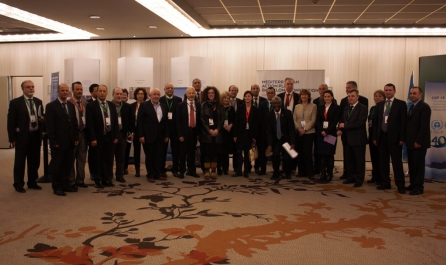Search
02/16: Celebrating 40 Years of Cooperation for a Healthy Mediterranean
Athens, 11 February 2016 – During a high level event of the Barcelona Convention CoP 19 meeting, hosted by the Greek Government in Athens, Mediterranean ministers and parties contracted to the Convention, renewed their commitment to enhance measures to reduce pressures on their marine and coastal environment.
The ministerial session was opened by Mr. Ioannis Tsironis Alternate Minister of Environment and Energy of Greece, who said: “It is a great pleasure for me to welcome you to Athens in this meeting that coincides with the 40th anniversary of the Barcelona Convention and the Mediterranean Action Plan. Environmental protection, which used to be on the sidelines of the political agenda, is now at the center of our quest on how our societies can move on to the future. The Mediterranean Action Plan has proven it can contribute to many fields with great success".
With the theme "Forty Years of Cooperation for Healthy and Productive Mediterranean Sea and Coast: A Collective Journey Towards Sustainable Development", participants to the meeting celebrated with pride the 40th anniversary of the Barcelona Convention, which, together with the Mediterranean Action Plan (MAP), represents one of the most advanced legal regimes worldwide for the protection of marine and coastal environment.
Representing UNEP, Assistant Secretary General and Deputy Executive Director of UNEP, Mr. Ibrahim Thiaw said: «I am very proud to celebrate with you today the 40th anniversary of the Barcelona Convention. Forty years of success. Forty years of management of an exceptional ecosystem that not only one, or two but three continents share! Forty years of cooperation, collaboration and solidarity between North and South, beyond political divergences, social upheavals, and economic differences. Thiaw pointed out that this meeting was one of the first major conferences taking place after the adoption of the 2030 Agenda and the Paris Climate Agreement. “While 2015 will be remembered as a major milestone in terms of international agreements, 2016 has been called the year for implementation and delivery. We must seize that opportunity, and ride that momentum,” he added.
Since its inception, the MAP-Barcelona Convention has been addressing the opportunities and challenges of the environment of the Mediterranean Sea and coasts, and striving to link environmental sustainability with socio-economic development. Over the past forty years, the main objectives of the Convention - assessment and control of marine pollution, protection of the marine environment and coastal zones, sustainable management of natural marine and coastal resources, strengthening solidarity among Mediterranean Coastal States - have spurred much progress.
Mediterranean Ministers reiterated in their statements their commitment to continue their common efforts to tackle the existing and emerging challenges to achieve the Mediterranean Ecological Objectives, and contribute to sustainable development.
Highlighting their concerns by the continued threats posed to the Mediterranean by major pressures affecting the sea and its coastal inhabitants, they adopted the Athens Declaration, in which they pledged to implement the instruments, programmes, action plans and guidelines adopted at COP 19 -to prevent pollution from maritime transport, marine exploration, and land-based activities, protect biodiversity, manage coastal zones, and increase the resilience of the Mediterranean to the impacts of climate change -, as crucial means for the achievement of the objectives of the Barcelona Convention and its Protocols.
Two memoranda of understanding (MoU) were also signed with the Black Sea Convention and ACCOBAMS secretariats respectively.
UNEP/MAP and Black Sea Convention agreed to cooperate in the collection and assessment of information relating to integrated marine monitoring programmes, to ecosystem-based approach and to the implementation of Integrated Coastal Zone Management protocols. Raising awareness activities and development of capacity building activities were also part of the MoU.
With ACCOBAMS, UNEP/MAP agreed to cooperate on the collection and assessment of information relating to the conservation of cetaceans, and the identification, protection and management of marine areas of particular importance for them and to promote the ecosystem based approaches for the conservation of marine environment and ecosystems. Both parties agreed on raising awareness activities and development of capacity building activities.




Find Us On...